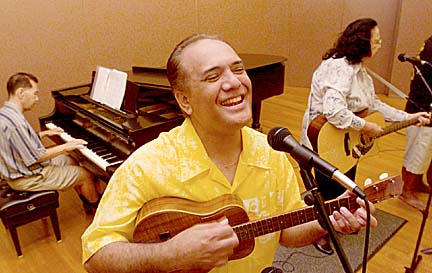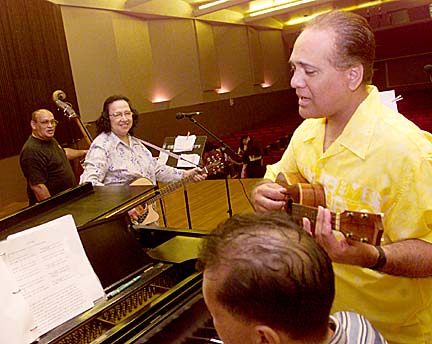


Rare treasures Kimo Alama Keaulana has in his small and comfy Manoa home a plain, unadorned wooden file card box. But it's a special box that contains nothing less than a treasure trove of rarely performed Hawaiian songs, each a rare gem.
found in mele
Kimo Alama Keaulana
is a steward of older,
traditional Hawaiian musicBy Gary C. W. Chun
gchun@starbulletin.comIt's only appropriate that the title for Keaulana's Saturday evening program of some of these Hawaiian mele, featuring himself and his band Lei Hulu, is "Rare Gems: An Evening of Hawaiian Music." It promises to be an evening that not only evoke a Hawaii of a bygone era, but a sense and sensibility not often heard in today's local music, dominated by "island rhythm." It will also be the first time Lei Hulu will present these songs in a concert setting.
Keaulana knows all too well how precious these songs are. The Hawaiian hula, music, language and studies teacher at Honolulu and Windward Community Colleges feels he was entrusted to keep the artistic integrity of each mele whole, to the point of refusing to tamper with them in performance in any way shape or form.

Besides his lectures, hula and band concerts at the UH's Elderhostel for nine years running, Keaulana said the band also performs at private engagements. "It's a very traditional and older form of Hawaiian music," he said in an interview, carefully choosing his words. "This is the kind of music that people in their 60s have grown up with."I think the younger generation is confusing traditional Hawaiian music with popular island music from people like Keali'i Reichel and Frank Kawaikapuokalani Hewett."
Starting with his childhood, the 46-year-old Keaulana said the music was a natural part of his development. "I grew up in a different time," he said, "without so many distractions that kids have nowadays. I think it was easier then to pick up an ukulele (his band instrument) because I was living in an environment that fosters learning every single day, whether it was chants, strumming the ukulele or drumming.
"Both sides of my family go back several generations of composers, teachers, musicians and dancers. I've been told I'm one of the last people to have been formally taught Hawaiian music."
The bulk of what he was taught, plus much of Lei Hulu's repertoire, came from his teacher, Adeline Nani Maunupau Lee. Lei Hulu, originally a trio, was born on the occasion of Aunty Adeline's last birthday in June 1992. Now grown to, at times, five members, Lei Hulu has also performed at the Honolulu Academy of Arts, Queen Emma's Summer Palace for the Daughters of Hawai'i civic group, and at the Bishop Museum, where Keaulana's mele collection is housed in its archives. The collection contains nearly a thousand Hawaiian language songs with translations, explanations and cross references.
While the group has performed infrequently this year, Lei Hulu played before one of their largest audiences at the UH's Center for Hawaiian Studies in March. Among the appreciative 350 or so who attended, Keaulana said, "there was a mix of young people, who didn't realize that these kinds of songs existed, to the older ones in their 70s to 90s who were very happy to hear that these songs haven't all gone away."
His wooden box of songs first belonged to Aunty Alice Namakelua, who was a co-worker of Aunty Adeline's. "From both of them, I learned so much about Hawaiian music," Keaulana said. "The instrumentation of Lei Hulu is all acoustic, with the exception of the steel guitar, which originated with the spread of electrical power in the 1930s.
"There are certain rhythm patterns that hold the origins of Hawaiian music, in ancient chant and dance forms. How 'modern' Hawaiian music is defined was through the introduction of the church hymn (himene), where a wider range of musical notes became included, and technically, it's not in the chant form."
If there's one thing you can't accuse Keaulana of, is that he's a careerist. "Aunty Adeline would always lead me to some other kupuna, people who weren't into music and hula for the money, but did it more from the heart.
"I consider the music I play and collect really precious and priceless," he said. "I've conscientiously decided to not make a huge commercial venture of this. There's so much hype in Hawaiian music nowadays, that when I was approached by the Elderhostel's Keven Williams to put on this program, I thought that, since it's associated with the University, this could be done in a nice, tasteful way."
Much, if not all, of the program's carefully-selected songs, according to Keaulana, have never been heard or haven't been heard in a very long time. "You can expect to hear some hapa-haole stuff, but most of it will be presented in the Hawaiian language."
The oldest song that will be presented is a hula puniu chant dating back to 1873, "Ku E Ka 'Oli'oli," that Mrs. Hattie Au taught in its original chant version 30 years ago. A waltz version of that same text was written for King Lunalilo, "Lunalilo Mo'i," will then follow.
"This mele was never recorded and no sheet music exists; Aunty Adeline taught it to me," said Keaulana. "It tells of how the people felt about their new king, how happy and elated they were."
By contrast, the most modern number is one from 1970, "Aloha Pua Melia," written by George Huddy specifically for Kealoha Kalama's show at the old Waikiki Resort Hotel. Keaulana joined the show at age 16 and is a sentimental favorite of his.
One of the more fascinating songs is the "Earl Finch Hula," written in the Hawaiian language by Alice Johnson in tribute to a businessman who befriended and helped the 442nd while the unit was stationed in Mississippi. A song from the 1920s, "Barbara," is another Hawaiian language song written by George Naope's grandfather, Harry Naope, about the daughter of one of the Parker Ranch managers of that day.
While many people have passed through the group over its nine-year history, tomorrow night's concert features the current lineup of Keaulana on ukulele and his older compatriots, all in their 60s: his cousin Joe Keaulana, Jr. on acoustic bass, Aunty Pahukoa Morse on rhythm guitar, Clayton Lanihuli Lee on piano and Akira "Kilakila" Ozawa on steel guitar.
And Keaulana prefers the company of older musicians. "I've come to find out that the younger ones generally don't have the right approach and technique these songs need to be played. It's like their approach to the music is 'caught,' rather than 'taught.'
"The rhythm has to be in the marrow of their bones and in their makeup. The strumming and singing and phrasing of the Hawaiian words has to go beyond fourth-year Hawaiian. Academic and spoken Hawaiian is not the same when singing in the Hawaiian language.
"I'll also be telling the people that night the stories behind the songs," Keaulana said, "and illustrate some of them with hula, with members of my Lei Hulu Hula School. The school teaches an older type of non-competitive hula, a style that goes as late as the 1960s.
"I was given these songs, because I was trusted to treat them properly. Aunties Adeline and Alice appreciated our style of performance, and I always promised to them never to deface them in any way," he said.
While the original trio cut a CD in 1993, and several of his archived songs have been covered by other contemporary Hawaiian acts, Keaulana said he himself is "afraid of recording another CD, because I respect these other people's work. I can't just take this music and rearrange it to suit my ideas or make it more 'commercial.' It's like taking the 'Mona Lisa' and changing it around. I feel I don't have that right.
"So long as I can teach these songs in the way my own teachers wanted, I'll keep it going. My feeling is that if these songs do die out, let them die in dignity. There's a certain lifespan to these songs and hulas. There's nothing we can do about it."
Where: Orvis Auditorium, University of Hawaii Rare Gems: An Evening
of Hawaiian Music
When: 7:30 p.m. tomorrow
Admission: $12 general; $10 students/seniors/UH faculty and staff
Call: 956-5666
Click for online
calendars and events.